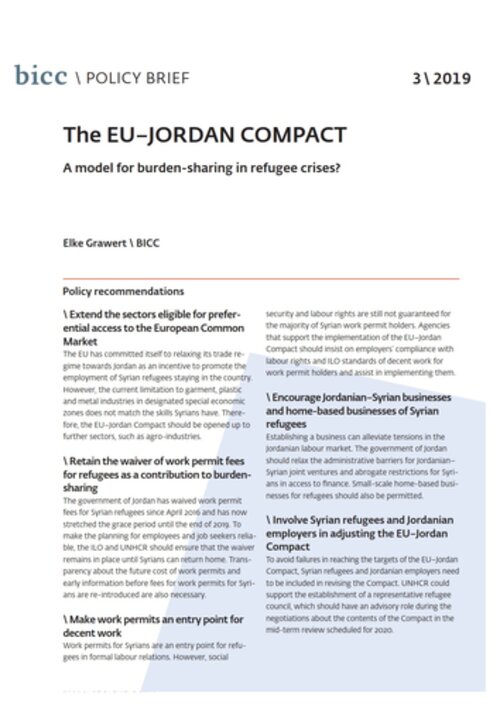Publications
The EU–Jordan Compact – A model for burden-sharing in refugee crises?
Release Date
2019-03
Language
- English
Topics
- –
The EU-Jordan Compact links support for the government of Jordan as the host country of more than 670,000 registered Syrian refugees (in 2018) with economic cooperation and trade liberalisation to satisfy the interests of the government of Jordan and the European Union (EU). Established in 2016, the Compact aims to integrate Syrian refugees in the Jordanian labour market.
The author Elke Grawert gives the following recommendations:
\ Extend the sectors eligible for preferential access to the European Common Market
The EU has committed itself to relaxing its trade regime towards Jordan as an incentive to promote the employment of Syrian refugees staying in the country. However, the current limitation to garment, plastic and metal industries in designated special economic zones does not match the skills Syrians have. Therefore, the EU–Jordan Compact should be opened up to further sectors, such as agro-industries.
\ Retain the waiver of work permit fees for refugees as a contribution to burden-sharing
The government of Jordan has waived work permit fees for Syrian refugees since April 2016 and has now stretched the grace period until the end of 2019. To make the planning for employees and job seekers reliable, the ILO and UNHCR should ensure that the waiver remains in place until Syrians can return home. Transparency about the future cost of work permits and early information before fees for work permits for Syrians are re-introduced are also necessary.
\ Make work permits an entry point for decent work
Work permits for Syrians are an entry point for refugees in formal labour relations. However, social security and labour rights are still not guaranteed for the majority of Syrian work permit holders. Agencies that support the implementation of the EU–Jordan Compact should insist on employers’ compliance with labour rights and ILO standards of decent work for work permit holders and assist in implementing them.
\ Encourage Jordanian–Syrian businesses and home-based businesses of Syrian refugees
Establishing a business can alleviate tensions in the Jordanian labour market. The government of Jordan should relax the administrative barriers for Jordanian-Syrian joint ventures and abrogate restrictions for Syrians in access to finance. Small-scale home-based businesses for refugees should also be permitted.
\ Involve Syrian refugees and Jordanian employers in adjusting the EU–Jordan Compact
To avoid failures in reaching the targets of the EU–Jordan Compact, Syrian refugees and Jordanian employers need to be included in revising the Compact. UNHCR could support the establishment of a representative refugee council, which should have an advisory role during the negotiations about the contents of the Compact in the mid-term review scheduled for 2020.
PDF-Download
BICC_Policy_Brief_3_2019.pdf
[English] (224.96 KB)

Cite as
@techreport{Grawert2019,
author = "Elke Grawert",
title = "The EU–Jordan Compact – A model for burden-sharing in refugee crises?",
latexTitle = "The EU–Jordan Compact – A model for burden-sharing in refugee crises?",
publisher = "BICC",
number = "3",
institution = "BICC",
type = "BICC Policy brief",
year = "2019",
address = "Bonn",
}
Document-Type
BICC Policy brief
Publisher
BICC
Place
Bonn
Countries/Region
Jordan



